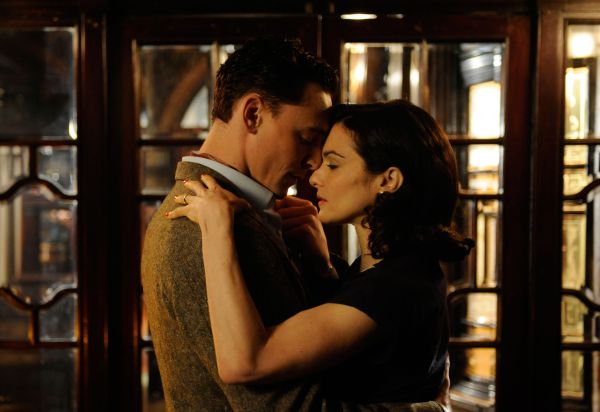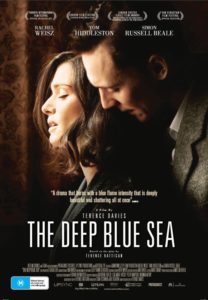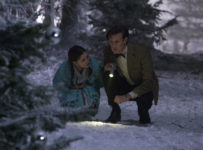Terence Davies’ latest film keeps a stiff upper lip on all things going on down below, but holds us at arm’s length despite some terrific performances.
Director: Terence Davies
Writer(s): Terence Rattigan
Runtime: 98 minutes
Starring: Tom Hiddleston, Rachel Weisz, Simon Russell Beale
Distributor: Transmission
Country: UK
Rating: Worth A Look (?)
Terence Rattigan’s 1952 play The Deep Blue Sea, dealing with the difficult subject of suicide in post-war Britain, has gone through various waves of revivals over the years. Although its initial season was successful, the subsequent Broadway run was cut short due to a poor reception. Adapted to the screen in 1955, with Vivien Leigh and Kenneth Moore, a 1994 revival saw Colin Firth, Ian Holm and Penelope Wilton tackle the roles. The emotionally raw piece was bound to eventually attract the attention of a filmmaker known for roles that tested the emotions of its leads, and House of Mirth and Distant Voices, Still Lives director Terence Davies is perhaps the ideal person to tackle it.
Following the attempted suicide of Hester Collyer (Rachel Weisz), the much younger wife of High Court judge Sir William Collyer (Simon Russell Beale), we begin to learn of her affair with the dashing young former RAF pilot Freddie Page (Tom Hiddleston), who is still coming to grips with his time in the war. Told through a series of flashbacks, we not only learn of the start of the affair and its discovery, but the effects of her attempted suicide and the inability for either pairing to fully satisfy Hester’s emotional and sexual desires.
Indeed, the title The Deep Blue Sea is said to refer to the dilemma Hester faces, caught as it were between the devil and the deep blue sea. On the one had she could return to a passionless marriage, on the other is a passionate man who cannot love her the way she wants to be loved. An opening title tells us that the film is set “around 1950″, speaking volumes of the post-war malaise that Great Britain found itself in, no longer at war but yet to find the revolution that the swinging 60s would provide. Yet while Rattigan’s play may keep this macro-level view in the background, bringing to light the realities of the British view of sex and class during the period, it is principally about the indecision of its character.
[jwplayer config=”Custom Player” mediaid=”51485″]
Terence Davies rivals Terrence Malick in the pace of his cinematic output, and takes the same measured look at 1950s Britain as he does with his other films. Davies unashamedly refuses to update the material, capturing his period and the characters within it down to the dingy flat that Hester and Freddie share in their final days together. This includes a somewhat caricaturish performance from the always-reliable Hiddleston, complete with a plethora of “old beans” general toodle-pippery. This is contrasted with some roguish bastardy that Freddie later reveals in his inability to deal with either Hester’s emotions, his inability to respond and his own realisation that his wartime fiascoes haven’t translated to post-war glory. Both leads can turn on a dime emotionally, and extended yelling spats are sometimes a little too real for comfort.
The Deep Blue Sea may explore stereotypes, and this might be the point, but it is also a cold emotional barrier towards truly getting a handle on any of the characters. The Deep Blue Sea is undoubtedly a downer of a piece, with amazing performances and stunning photography, but another “because of the times” piece is ultimately all we get here. Perhaps Rattigan, speaking directly to this Greek tragedy parallel through Hester, sums it up nicely “sad perhaps, but hardly Sophocles”.
The Deep Blue Sea is released in Australia on 12 April 2012 from Transmission.





